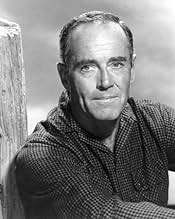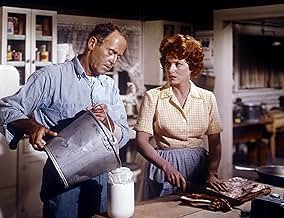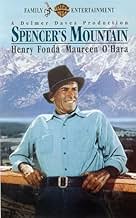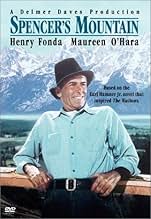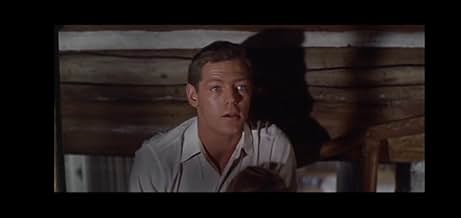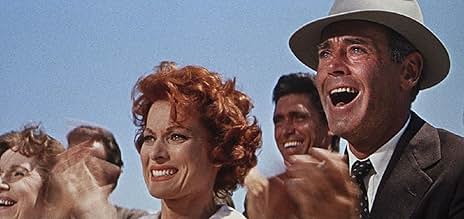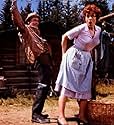IMDb-BEWERTUNG
7,0/10
3360
IHRE BEWERTUNG
Füge eine Handlung in deiner Sprache hinzuGrand Teton quarryman and family patriarch carefully navigates issues of religion and education in order to eke out a brighter future for his family.Grand Teton quarryman and family patriarch carefully navigates issues of religion and education in order to eke out a brighter future for his family.Grand Teton quarryman and family patriarch carefully navigates issues of religion and education in order to eke out a brighter future for his family.
- Regie
- Drehbuch
- Hauptbesetzung
- Auszeichnungen
- 1 Nominierung insgesamt
William Breen
- Mountain Boy
- (Nicht genannt)
Veronica Cartwright
- Becky Spencer
- (Nicht genannt)
Michele Daves
- Donnie Spencer
- (Nicht genannt)
Martin Eric
- Odell Harper
- (Nicht genannt)
Empfohlene Bewertungen
I had seen this movie in high school with a friend I grew up with and his family at a Drive-In, and it made such an impression on me at that time, probably because of the wholesomeness of the whole thing; I saw it several times thereafter, but, until recently had not viewed it for years; I bought the DVD version and watched it last night and it was just as I had remembered it, a family movie, the likes of which you will never see again.... I especially enjoyed the extras, including the premiere newsreel and interviews; the scenery is breathtaking especially on a large screen TV, and the story always keeps your interest...it is hard to explain, but to someone of my generation, they just don't make them like this anymore!! What a joy to see such actors as Henry Fonda, Maureen O'Hara, Wally Cox, Virginia Gregg, Lillian Bronson, and Donald Crisp displaying their fine talents in this film... IT was interesting to see what a fine job James MacArthur did prior to Hawaii Five O, as he had done in several Disney pictures of the era....there is a very young Kim Karayth, who later went on to fame as the youngest sibling in The Sound Of Music and other family pictures, and Veronica Cartwright, who played on many television series and also in the Hitchcock thriller "The Birds." This was the heyday of family moviemaking...where did it all go??
"Spencer's Mountain" is an enjoyable family drama with touches of humor throughout. The outdoor scenery is spectacular. The film was shot in Grand Teton National Park, around Jackson Hole, WY, and in California. The movie is based on a 1961 novel of the same title, by Earl Hamner Jr. Some of the characters and experiences in the film are from his background, growing up near the Blue Ridge Mountains of Virginia during the Great Depression.
Hamner would write another novel in 1970 that further expands on his boyhood growing up as the oldest child in a large family. That book, "The Homecoming: A Novel About Spencer's Mountain," led to the 1971 movie by the same title that in turn spawned the nine-year TV series, "The Waltons."
I don't know why this film was set in Wyoming instead of Virginia, but the expansive shots of the scenery could be one reason. By the middle 20th century, it would have been hard to find shots like that in Virginia that didn't show much more modern development. "The Homecoming" was also shot in Wyoming in 1971, although the story was clearly set in Virginia.
Many people who watched the later film and then the Waltons on TV (1972- 81) didn't know that this movie was part of Hamner's story of Walton's Mountain as well.
The cast of "Spencer's Mountain' is very good. Henry Fonda excelled as Clay Spencer. Another reviewer commented about the types of role he played, and I agree that Fonda was best with this type of role. He also was good with dramatic roles, but he didn't have the stuff for comedy. He was mildly OK in a couple that he made, but not too good in the others. That's probably why he made so few comedies. His forte in Westerns was as the bad guy.
Maureen O'Hara is wonderful as Olivia Spencer and James MacArthur plays Clayboy. That's the role that Richard Thomas had in the later film and the series as John-Boy. The rest of the cast are all quite good.
This is a somewhat different story than what Hamner writes for the Waltons. The special home that Clay starts to build for Olivia, and then the fire that destroys it. It's an interesting and entertaining movie that most should enjoy.
Hamner would write another novel in 1970 that further expands on his boyhood growing up as the oldest child in a large family. That book, "The Homecoming: A Novel About Spencer's Mountain," led to the 1971 movie by the same title that in turn spawned the nine-year TV series, "The Waltons."
I don't know why this film was set in Wyoming instead of Virginia, but the expansive shots of the scenery could be one reason. By the middle 20th century, it would have been hard to find shots like that in Virginia that didn't show much more modern development. "The Homecoming" was also shot in Wyoming in 1971, although the story was clearly set in Virginia.
Many people who watched the later film and then the Waltons on TV (1972- 81) didn't know that this movie was part of Hamner's story of Walton's Mountain as well.
The cast of "Spencer's Mountain' is very good. Henry Fonda excelled as Clay Spencer. Another reviewer commented about the types of role he played, and I agree that Fonda was best with this type of role. He also was good with dramatic roles, but he didn't have the stuff for comedy. He was mildly OK in a couple that he made, but not too good in the others. That's probably why he made so few comedies. His forte in Westerns was as the bad guy.
Maureen O'Hara is wonderful as Olivia Spencer and James MacArthur plays Clayboy. That's the role that Richard Thomas had in the later film and the series as John-Boy. The rest of the cast are all quite good.
This is a somewhat different story than what Hamner writes for the Waltons. The special home that Clay starts to build for Olivia, and then the fire that destroys it. It's an interesting and entertaining movie that most should enjoy.
Before The Waltons, there was Spencer's Mountain. Based on the autobiographical novel by Earl Hamner, Jr, this heartwarming family drama fathered the beloved TV series and features all its familiar ingredients-poor family with nine children struggling to make ends meet, rural setting, live-in grandparents, gifted oldest son, mother named Livvie, coming-of-age crises-the list goes on and on. Even the famous (and corny) "good night" ritual debuts here; the names may be different (there's no Mary Ellen, Jason or Jim-Bob), but the indelible long shot-darkened house with one lamp burning in an upstairs window-is framed exactly as it would be on television nine years later.
Along with the similarities, though, come some changes. Instead of Depression-era Appalachia, the Spencers confront their problems in contemporary Wyoming, affording a more dramatic backdrop and the ability to deal with modern mores. And instead of John-Boy, we have Clay-Boy (James MacArthur), the oldest son of Clay Spencer (Henry Fonda) and his wife (Maureen O'Hara). While Clay-Boy is not an aspiring writer like his TV counterpart (and flaunts a decidedly more beefy physique), he does win top honors in his high school class and harbors a potent desire to attend college and escape his sheltered mountain life. Clay-Boy's efforts to meet the university's academic and financial requirements, as well as Clay Sr.'s burning wish to build his dream house, are among the everyday issues the Spencers must face.
Maybe if The Waltons never existed, Spencer's Mountain would better stand the test of time. But so ingrained is The Waltons in our collective conscience, it's difficult to divorce Spencer's Mountain from it-and from the elements that have prompted merciless parody over the years. The folksy, homespun attitudes that permeate Delmer Daves' production alternately provoke charmed smiles and withering cringes, usually depending on who is speaking the lines. And while the film benefits from breathtaking location shooting in Grand Teton National Park, even the majestic snow-capped peaks can't dilute the sugar coating that drips from many scenes.
Unfortunately, the younger actors bear the brunt of the blame. MacArthur tries his best, but often is sabotaged by the annoying Mimsy Farmer (yes, Mimsy) as Clay-Boy's sweetheart Claris, whose hormones rage so ferociously she practically eats Clay-Boy alive during their breathy love scenes. Such frank treatment of blossoming sexuality is commendable, but seems laughably inappropriate in such a family-oriented film, at times transforming Spencer's Mountain into a watered-down version of A Summer Place (interestingly enough, also directed by Daves).
Fonda and O'Hara, on the other hand, make an ideal couple, acting with an ease and familiarity that gives their relationship a warm, comfortable feel. Fonda especially embodies the uneducated, hard-drinking, heart-of-gold Clay Sr., always willing to fight and sacrifice so his brood can enjoy a richer, more prosperous life. Without a doubt, Fonda is the soul of Spencer's Mountain, and his natural, beautifully shaded portrayal keeps the film from descending into a maudlin mess.
Despite its shortcomings, Spencer's Mountain is tough to knock. Featuring forthright, salt-of-the-earth characters, timeless family themes and lovely cinematography, it wiggles its way into the heart and, like the noble Spencers, we graciously forgive its faults.
Along with the similarities, though, come some changes. Instead of Depression-era Appalachia, the Spencers confront their problems in contemporary Wyoming, affording a more dramatic backdrop and the ability to deal with modern mores. And instead of John-Boy, we have Clay-Boy (James MacArthur), the oldest son of Clay Spencer (Henry Fonda) and his wife (Maureen O'Hara). While Clay-Boy is not an aspiring writer like his TV counterpart (and flaunts a decidedly more beefy physique), he does win top honors in his high school class and harbors a potent desire to attend college and escape his sheltered mountain life. Clay-Boy's efforts to meet the university's academic and financial requirements, as well as Clay Sr.'s burning wish to build his dream house, are among the everyday issues the Spencers must face.
Maybe if The Waltons never existed, Spencer's Mountain would better stand the test of time. But so ingrained is The Waltons in our collective conscience, it's difficult to divorce Spencer's Mountain from it-and from the elements that have prompted merciless parody over the years. The folksy, homespun attitudes that permeate Delmer Daves' production alternately provoke charmed smiles and withering cringes, usually depending on who is speaking the lines. And while the film benefits from breathtaking location shooting in Grand Teton National Park, even the majestic snow-capped peaks can't dilute the sugar coating that drips from many scenes.
Unfortunately, the younger actors bear the brunt of the blame. MacArthur tries his best, but often is sabotaged by the annoying Mimsy Farmer (yes, Mimsy) as Clay-Boy's sweetheart Claris, whose hormones rage so ferociously she practically eats Clay-Boy alive during their breathy love scenes. Such frank treatment of blossoming sexuality is commendable, but seems laughably inappropriate in such a family-oriented film, at times transforming Spencer's Mountain into a watered-down version of A Summer Place (interestingly enough, also directed by Daves).
Fonda and O'Hara, on the other hand, make an ideal couple, acting with an ease and familiarity that gives their relationship a warm, comfortable feel. Fonda especially embodies the uneducated, hard-drinking, heart-of-gold Clay Sr., always willing to fight and sacrifice so his brood can enjoy a richer, more prosperous life. Without a doubt, Fonda is the soul of Spencer's Mountain, and his natural, beautifully shaded portrayal keeps the film from descending into a maudlin mess.
Despite its shortcomings, Spencer's Mountain is tough to knock. Featuring forthright, salt-of-the-earth characters, timeless family themes and lovely cinematography, it wiggles its way into the heart and, like the noble Spencers, we graciously forgive its faults.
Henry Fonda throughout his career showed a great flair for playing rustic characters and endowing them with dignity. In fact that was his introduction to film when he did the movie version of the play that made him a star, The Farmer Takes A Wife. Of course as Fonda started playing more of a variety of roles he was less and less in rustic settings.
His last role of this type was as Clay Spencer in Spencer's Mountain a feel good family type picture with a rather interesting take on the facts of life. Country folks like the Spencers who deal a lot in livestock are familiar with the breeding process so it's not a huge big deal with them. At least it's not in this film as Mimsy Farmer is ready to finish James MacArthur's eduction in that regard. One of the best scenes in the film is Henry Fonda bringing over his bull to mate with one of Dub Taylor's cows with everybody looking on. I guess they're starved for entertainment in that part of the country.
In fact MacArthur's further education is what drives the film. He's the oldest of Fonda's and Maureen O'Hara's nine children and the first to graduate high school. His teacher Virginia Gregg wants to see him get ahead and go to the university. But the financial and other obstacles are considerable. Even the new minister Wally Cox tutors MacArthur in a needed Latin course.
If the Spencers bear no small resemblance to the Walton family that's because Earl Hammer who created the Waltons also wrote the novel this film was based on. Spencer's Mountain is beautifully photographed in the Grand Teton mountains of Wyoming, just as pretty and more majestic than the Walton's Appalachians. Delmer Daves who directed Spencer's Mountain also directed Jubal a few years earlier, a western also set in the Grand Tetons. The cinematography is just as good, but the resemblance stops there because Jubal is quite the adult western.
Spencer's Mountain marked the farewell performance of Donald Crisp who was 81 years old when he filmed this and had a career going back to the earliest silent films. He was a grand character actor who played an awesome variety of parts. Here he's in his family patriarch persona as Fonda's father married to Lillian Bronson in the film. Crisp won his Oscar as the family patriarch in John Ford's How Green Was My Valley.
Spencer's Mountain did good box office and it's a nice family film. But Henry Fonda's new agent passed on a Broadway play called Who's Afraid Of Virginia Woolf and signed his client for this. Fonda never forgave the agent, I can't really blame him.
His last role of this type was as Clay Spencer in Spencer's Mountain a feel good family type picture with a rather interesting take on the facts of life. Country folks like the Spencers who deal a lot in livestock are familiar with the breeding process so it's not a huge big deal with them. At least it's not in this film as Mimsy Farmer is ready to finish James MacArthur's eduction in that regard. One of the best scenes in the film is Henry Fonda bringing over his bull to mate with one of Dub Taylor's cows with everybody looking on. I guess they're starved for entertainment in that part of the country.
In fact MacArthur's further education is what drives the film. He's the oldest of Fonda's and Maureen O'Hara's nine children and the first to graduate high school. His teacher Virginia Gregg wants to see him get ahead and go to the university. But the financial and other obstacles are considerable. Even the new minister Wally Cox tutors MacArthur in a needed Latin course.
If the Spencers bear no small resemblance to the Walton family that's because Earl Hammer who created the Waltons also wrote the novel this film was based on. Spencer's Mountain is beautifully photographed in the Grand Teton mountains of Wyoming, just as pretty and more majestic than the Walton's Appalachians. Delmer Daves who directed Spencer's Mountain also directed Jubal a few years earlier, a western also set in the Grand Tetons. The cinematography is just as good, but the resemblance stops there because Jubal is quite the adult western.
Spencer's Mountain marked the farewell performance of Donald Crisp who was 81 years old when he filmed this and had a career going back to the earliest silent films. He was a grand character actor who played an awesome variety of parts. Here he's in his family patriarch persona as Fonda's father married to Lillian Bronson in the film. Crisp won his Oscar as the family patriarch in John Ford's How Green Was My Valley.
Spencer's Mountain did good box office and it's a nice family film. But Henry Fonda's new agent passed on a Broadway play called Who's Afraid Of Virginia Woolf and signed his client for this. Fonda never forgave the agent, I can't really blame him.
Leonard Maltin calls the film "mawkish", and he is right on, but it is still great fun. Mimsy Farmer's Claris is a hoot ("friction, friction, friction!")! Excellent use of the Jackson Hole locations, especially the Triangle X guest ranch, which served as the Spencer homestead and is still in operation here. Two trivia notes: Bronwyn Fitzsimmons, who played the college secretary, is Maureen O'Hara's daughter in real life. According to AMC Magazine, Henry Fonda showed some off-screen interest in her that O'Hara had to squash. Fonda did the film even though he thought it was so corny it would set U.S. movie-making back 20 years. Also, you have Wally Cox's character listed as GoodMAN, but the name was actually GoodSON. Highly recommended.
Wusstest du schon
- WissenswertesIn their book "How Underdog Was Born...", W. Watts Biggers and Chad Strover reveal that seeing Wally Cox's performance in this movie inspired them to ask him to voice their newly created character, Underdog.
- PatzerWhen Clay Spencer is driving to the university he's in what looks like a 1955 Ford F100 truck. When he arrives at the school he's driving a 1956 Ford F100. Then when he gets back to the library he's again driving the older model Ford truck.
- Zitate
Miss Parker: The world steps aside to let any man pass if he knows where he is going.
- VerbindungenFeatured in Salut für ...: Salut für Henry Fonda (1978)
- SoundtracksAmerica the Beautiful
(uncredited)
Words by Katharine Lee Bates 1904
Music by Samuel A. Ward, 1882
Sung by Barbara McNair
Top-Auswahl
Melde dich zum Bewerten an und greife auf die Watchlist für personalisierte Empfehlungen zu.
- How long is Spencer's Mountain?Powered by Alexa
Details
- Laufzeit1 Stunde 39 Minuten
- Sound-Mix
- Seitenverhältnis
- 2.35 : 1
Zu dieser Seite beitragen
Bearbeitung vorschlagen oder fehlenden Inhalt hinzufügen

Oberste Lücke
By what name was Sommer der Erwartung (1963) officially released in India in English?
Antwort

